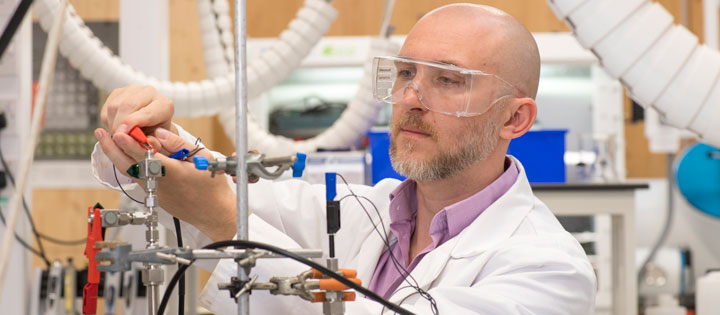University Of Nottingham’s battery research gets £5m funding
Application inspired research to make step changes in the development of next-generation batteries for electric transport has received a share of £5m funding to accelerate commercialisation.
The University of Nottingham is a core partner in one of six key battery research projects receiving a share of £29 million from the Faraday Institution, a leader in energy storage research.These existing projects on extending battery life, battery modelling, recycling and reuse, safety, solid-state batteries, and lithium-sulfur batteries, have been reshaped to focus on the areas with the greatest potential for success.
Part of this funding will allow the research team from the University of Nottingham’s School of Chemistry to expand on their work within the Faraday Institution’s LiSTAR (Lithium-Sulfur Technology Accelerator) project.
Li-S batteries are based on lighter materials than used in conventional Li-ion batteries and, as such, are promising for weight-sensitive technologies, such as in haulage, defence, shipping, and the aerospace sector. The use of Li-S batteries could also reduce the UK’s dependence on some of the critical elements used in Li-ion batteries, such as Cobalt.
The Nottingham team, along with their industrial partners OXLiD, the UK’s foremost developer of Li-S technologies, are developing additives that can increase the lifetime of Li-S batteries. The team is also working on new analytical technologies for studying the chemical reactions that occur inside the batteries, yielding new information that will help to improve their performance.
We’ve made great strides with the first phase of the research, in which we developed our battery additives. Our advances led to an exciting collaboration with OXLiD, who can help push this technology towards commercialisation. This injection of further funding from the Faraday Institution, combined with our deepening interactions with our industry partners, will allow us to build on our discoveries and take Li-S batteries closer to commercialisation.
Professor Darren Walsh, University of Nottingham, School of Chemistry
The Nottingham team and OXLiD have also secured a share of a £1.8m investment from the Faraday Battery Challenge, to further develop the commercialisation of the battery research. This funding will allow the team to explore the opportunities offered by semi-solid-state Li-S batteries, which can potentially push the lifetimes of Li-S batteries even further than in existing systems.
It’s exciting to have our own researchers working so closely with the university research team on the battery projects. We are laying the important foundations for a prototyping facility where we can build and test the battery research for industry use. The knowledge and expertise here at Nottingham is really putting it at the forefront of battery research in the UK.
Adrien Amigues, CEO of OxLiD
“The Faraday Institution is committed to identifying and investing in the most promising and impactful battery research initiatives,” commented Professor Pam Thomas, CEO, Faraday Institution. “This project refocusing is an important part of that process, and allows us to direct even more effort towards those areas of research that offer the maximum potential of delivering societal, environmental, and commercial impact.”
Business and Trade Minister Nusrat Ghani said: “Growing the battery industry is vital to positioning the UK as the best location in the world to manufacture electric vehicles.
“This funding will help businesses become more innovative and productive, helping to create more skilled, high-wage jobs across the UK, future-proofing our economy and supporting our ambition towards a cleaner, greener future.”
With over 500 researchers from 27 universities and 85+ industry partners, the Faraday Institution continues to drive innovation in energy storage technologies that will transform the UK energy landscape from transportation to the grid.

